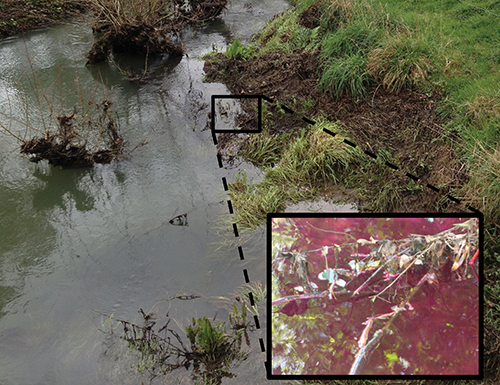Fate of Microplastics in Rivers

 Plastics are long lived materials and have littered the planet. There are lots of details, though, about their fate and transport that we still do not understand. In an international collaboration, Prof. Aaron Packman and his former PhD student, Dr. Jennifer Drummond, studied how microplastics are cycled in the sediments of rivers. They report their findings in the cover feature article in the recent issue in Environmental Science & Technology Letters, titled “Significance of Hyporheic Exchange for Predicting Microplastic Fate in Rivers”.
Plastics are long lived materials and have littered the planet. There are lots of details, though, about their fate and transport that we still do not understand. In an international collaboration, Prof. Aaron Packman and his former PhD student, Dr. Jennifer Drummond, studied how microplastics are cycled in the sediments of rivers. They report their findings in the cover feature article in the recent issue in Environmental Science & Technology Letters, titled “Significance of Hyporheic Exchange for Predicting Microplastic Fate in Rivers”.
 Microplastics are abundantly found in streambed sediments, including both small and low-density particles of neutral and positive buoyancy. Although the flow of water into streambed sediments (hyporheic exchange) has previously been shown to increase the rate of delivery of fine particles to the streambed, the influence of hyporheic exchange on microplastic fate in aquatic environments has not yet been assessed in detail. The researchers evaluate the effects of hyporheic exchange on microplastics by calculating and comparing the rates of delivery of microplastics to streambed sediments by hyporheic exchange and gravitational settling for combinations of particle size and density most commonly found in streams.
Microplastics are abundantly found in streambed sediments, including both small and low-density particles of neutral and positive buoyancy. Although the flow of water into streambed sediments (hyporheic exchange) has previously been shown to increase the rate of delivery of fine particles to the streambed, the influence of hyporheic exchange on microplastic fate in aquatic environments has not yet been assessed in detail. The researchers evaluate the effects of hyporheic exchange on microplastics by calculating and comparing the rates of delivery of microplastics to streambed sediments by hyporheic exchange and gravitational settling for combinations of particle size and density most commonly found in streams.
Through their research, Packman and co-workers discovered that 23% of all microplastic combinations have a hyporheic exchange rate that is higher than their settling rate. This fraction was as high as 42% for microplastics composed of low-density polymers, such as polyethylene. They then expanded these findings to consider a wide range of hydrodynamic conditions in rivers and demonstrate that hyporheic exchange is important for the transport and fate of particles that are <100 μm in diameter, irrespective of polymer type.
The lead author of this paper, Dr. Jennifer Drummond, was a member of the Packman research group and received her PhD from Northwestern in 2015. Currently, she is a Newton International Fellow at the University of Birminghan in the UK.
To read the full article, click here.
